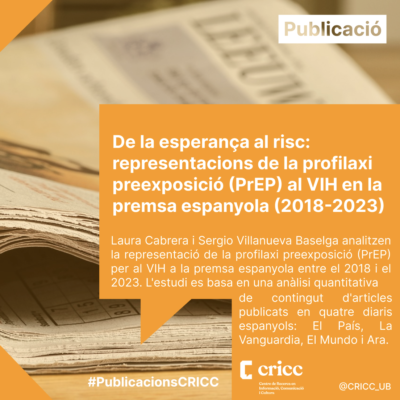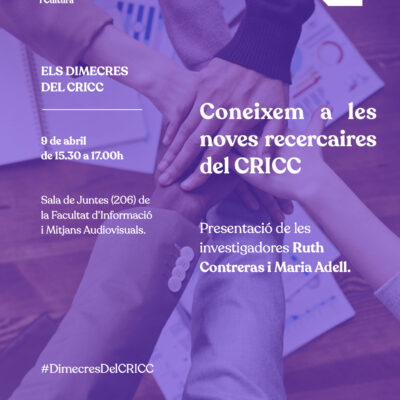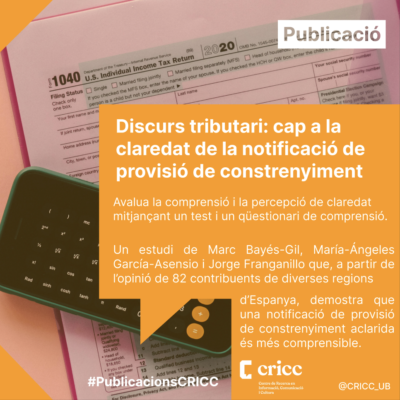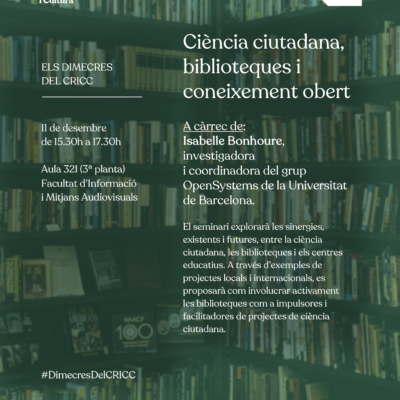Bozkurt, A., Xiao, J., Lambert, S., Pazurek, A., Crompton, H., Koseoglu, S., Farrow, R., Bond, M., Nerantzi, C., Honeychurch, S., Bali, M., Dron, J., Mir, K., Stewart, B., Costello, E., Mason, J., Stracke, C. M., Romero-Hall, E., Koutropoulos, A., Toquero, C. M., Singh, L., Tlili, A., Lee, K., Nichols, M., Ossiannilsson, E., Brown, M., Irvine, V., Raffaghelli, J. E., Santos-Hermosa, G., Farrell, O., Adam, T., Thong, Y. L., Sani-Bozkurt, S., Sharma, R. C., Hrastinski, S., & Jandrić, P. Speculative Futures on ChatGPT and Generative Artificial Intelligence (AI): A Collective Reflection from the Educational Landscape. (2023). Asian Journal of Distance Education (AJDE), 18 (1). https://www.asianjde.com/ojs/index.php/AsianJDE/article/view/70.
Gema Santos-Hermosa, a researcher at CRICC, collaborates in this publication in the Asian Journal of Distance Education (AJDE) with other international experts in open education. Her contribution has been in the writing of the article and also in two cases on ChatGPT in education, within the final section of “Speculative Future Narratives through Fictional Storytelling”.
While ChatGPT has recently become very popular, AI has a long history and philosophy. This paper intends to explore the promises and pitfalls of the Generative Pre-trained Transformer (GPT) AI and potentially future technologies by adopting a speculative methodology. Speculative future narratives with a specific focus on educational contexts are provided in an attempt to identify emerging themes and discuss their implications for education in the 21st century. Affordances of (using) AI in Education (AIEd) and possible adverse effects are identified and discussed which emerge from the narratives. It is argued that now is the best of times to define human vs AI contribution to education because AI can accomplish more and more educational activities that used to be the prerogative of human educators. Therefore, it is imperative to rethink the respective roles of technology and human educators in education with a future-oriented mindset.
Santos-Hermosa, G. (2023). The Role of Institutional Repositories in Higher Education: Purpose and Level of Openness. In: Otto, D., Scharnberg, G., Kerres, M., Zawacki-Richter, O. (eds) Distributed Learning Ecosystems . Springer VS, Wiesbaden. https://doi.org/10.1007/978-3-658-38703-7_4
The aim of this chapter is to consider repositories as distributed learning systems, exploring how they can influence higher education by allowing learners and teachers to deposit their educational resources for open sharing and use in teaching and learning processes. To this end, three essential issues will be addressed. The first is the current state of institutional repositories in higher education at international level. An overview will be offered—covering content, metadata, licences, educational and reuse aspects, etc.—to identify the different levels of development of these repositories, followed by a more specific contextualisation of the European case. The second issue, causally related to the first, is the question of what should be done to (further) increase the level of openness and interconnection of repositories in order to integrate them into education. In other words, how can we advance from open content and Open Educational Resources (OER) to Open Educational Practices (OEP), and from OAI-PHM (Open Archives Initiative Protocol for Metadata Harvesting) protocol interoperability to Linked Data and Open Informational Ecosystems? Finally, several ongoing initiatives will also be discussed as good practice models to be considered.
Santos-Hermosa, G., Quarati, A., Loría-Soriano, E., Raffaghelli, J.E. (2023). Why Does Open Data Get Underused? A Focus on the Role of (Open) Data Literacy. In: Raffaghelli, J.E., Sangrà, A. (eds) Data Cultures in Higher Education . Higher Education Dynamics, vol 59. Springer, Cham. https://doi.org/10.1007/978-3-031-24193-2_6
Open data has been conceptualised as a strategic form of public knowledge. Tightly connected with the developments in open government and open science, the main claim is that access to open data (OD) might be a catalyser of social innovation and citizen empowerment. Nevertheless, the so-called (open) data divide, as a problem connected to the situation of OD usage and engagement, is a concern.
In this chapter, we introduce the OD usage trends, focusing on the role played by (open) data literacy amongst either users or producers: citizens, professionals, and researchers. Indeed, we attempted to cover the problem of OD through a holistic approach including two areas of research and practice: open government data (OGD) and open research data (ORD). After uncovering several factors blocking OD consumption, we point out that more OD is being published (albeit with low usage), and we overview the research on data literacy. While the intentions of stakeholders are driven by many motivations, the abilities that put them in the condition to enhance OD might require further attention. In the end, we focus on several lifelong learning activities supporting open data literacy, uncovering the challenges ahead to unleash the power of OD in society.







